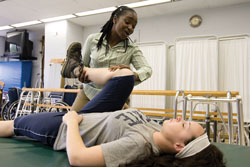Mother overcomes disability to become physical therapist
Doctor of Physical Therapy
|
There is a fine line between being inquisitive and simply being impolite. Renee Jones says most people fall into the former category as they stare at her wondering, “What happened to her leg?” The physical therapy doctoral graduate is used to the stares — and the challenges — that come with being an amputee. “Sometimes I think it is a disability because there are certain things I can’t do, but then again, not everyone is going to be able to do everything,” says Jones. “Maybe I can’t roller skate because of my physical condition, but maybe fear keeps you from skydiving.” The way Renee sees it is we are all challenged by our limitations — physical and mental — and make choices every day about how to handle them. You won’t find a handicapped placard in Renee’s car — she doesn’t use one. And you won’t find Renee shying away from strangers who ask how she lost part of her leg. |
 Photo by Ryan S. Brandenberg/Temple University
Physical Therapy doctoral recipient Renee Jones practices strengthening exercises with fellow student Megan Skahan in the Physical Therapy classroom and laboratory. |
|
“I’d like to enlighten them as opposed to them just continuing to stare or making up their own minds about what happened to me.” Renee was like any other child, but as she surpassed the “terrible twos,” one of her legs outgrew the other. The congenital deformation left doctors with no choice but to amputate below the left knee when Renee was just three years old. Then a car accident at the age of 22 damaged that same knee once again, forcing doctors to amputate what was left of her leg to just above the knee. “I remember I was so mean to my physical therapist after that second amputation. I just didn’t want to do the exercises or even get out of bed.” But she did, spending a month in rehab, growing stronger physically and mentally thanks to a physical therapy team. Eleven years later, she’s come full circle as she is the one helping physical therapy patients get stronger. And when she encounters a patient in a testy mood, she knows their frustrations first hand. What better encouragement for a physical therapy patient than to see their own therapist overcoming a disfigurement that could have easily become an excuse for not trying? Instead, Renee undergoes physical therapy herself so she can use her new knee prosthesis with no problems. After all, she’s got big plans after graduation, including running a marathon. In the meantime, she’s content chasing her young son. “Being a mom and a graduate student in school is so challenging, but thanks go to my faith in God and family,” she said. “I couldn’t have done this without them.” |
|